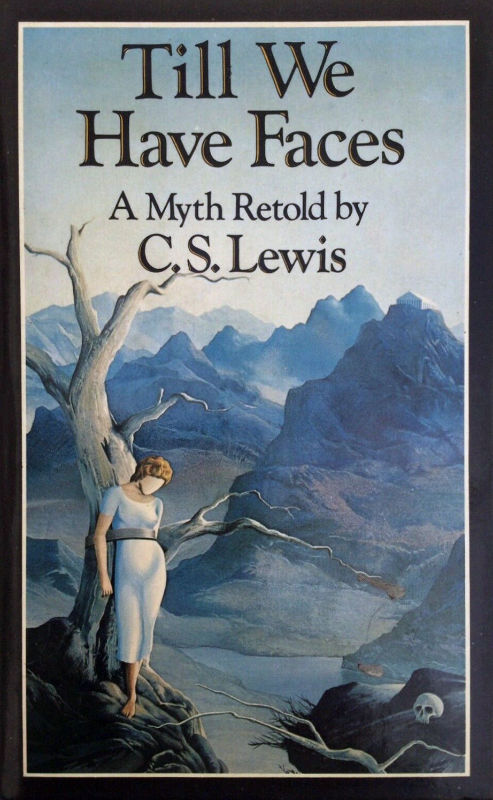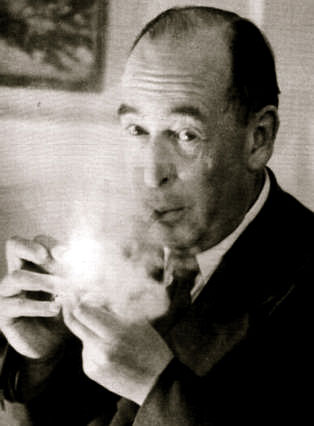As I noted in my previous post, my re-reading of C. S. Lewis’s Till We Have Faces has brought me face-to-face—so to speak—with the value of the book in ways I hadn’t fully appreciated in my first two readings of it. This novel based on the Greek tale of Cupid and Psyche didn’t attract me at first. One reason probably was due to my lack of interest in pagan myths. The other reason was that I had no knowledge of this particular myth.
The barriers in my mind have come down considerably. Knowing Lewis better now has shown me that even pagan myths contain some truths, however obscured or misunderstood by their cultures. His concept that pagan cultures might actually be closer to Truth than the postmodern era we live in today has caused me to rethink; pagans at least knew they were guilty before God (or the gods) and that something had to be done to bridge the chasm that separates mankind from deity. And unlike modern man, they believed, in most cases, that there was some kind of afterlife; the pure secularism that dominates our current culture didn’t exist.
I also saw in this re-reading some direct connections to Lewis’s own life and thinking as he grew and matured in the faith. As I read Till We Have Faces this time, I kept being reminded of certain passages in other Lewis writings.
There are too many such instances to fit into one post, so I’ll simply present one that stands out. For those unfamiliar with the story, hard times have fallen on the kingdom of Glome. The ruling religion teaches that a perfect sacrifice must be made to the gods in order for prosperity to be restored. Orual, the future queen who tells the story, loves her younger sister Psyche who has been chosen as the sacrifice. Her love, though, is more of a grasping kind that focuses on what the loss will mean to herself. Prior to Psyche being taken to the mountain to meet her fate, Orual manages to speak with her in her cell as she awaits the sacrifice she is to make the next day. What she hears from Psyche shocks and dismays her, yet this is pure Lewis showcasing what Christians should believe, albeit through pagan eyes.
The shock to Orual is that Psyche is not afraid of what will lead to her death. In fact, she actually seems to be looking forward to it. Psyche speaks of what their tutor, a Greek slave called the Fox, has taught them. “We have made little use of the Fox’s teaching if we’re to be scared by death,” she reminds Orual. But she goes further by indicating that the Fox may not have told them everything. “You know, Sister, he has sometimes let out that there were other Greek masters than those he follows himself.” The Fox, while teaching that one shouldn’t fear death, never offered any hope of a future life after death. Psyche reveals that these other masters “have taught that death opens a door out of a little, dark room (that’s all the life we have known before it) into a great, real place where the true sun shines and we shall meet—” Her sentence in not completed because Orual interrupts, calling Psyche cruel that she would be content to leave Orual all alone. In an attitude too common to all of us at times, self-pity takes over as she accuses Psyche of never loving her at all.
Psyche’s response is one of pure love, even though Orual can’t grasp it. “You don’t think a mortal life seems a long thing to me tonight? And how would it be better if I had lived?” After all, what did she have to look forward to? The king didn’t really love her. Her future was to be wed to someone who would probably make her life miserable.
What had I to look for if I lived? Is the world—this palace, this father—so much to lose? We have already had what would have been the best of our time. I must tell you something, Orual, which I never told to anyone, not even you. … I have always—at least ever since I can remember—had a kind of longing for death. … It was when I was happiest that I longed most. It was on happy days when we were up there on the hills, the three of us, with the wind and the sunshine. … Do you remember? The colour and the smell, and looking across at the Grey Mountains in the distance? And because it was so beautiful, it set me longing, always longing. Somewhere else there must be more of it.
Readers familiar with Lewis will immediately see the connection with the word “longing.” It brings back the primary thesis of both his autobiography, Surprised by Joy, and his first fictional Christian work, The Pilgrim’s Regress. He longed for those stabs of joy that he could never maintain, and John, the protagonist in The Pilgrim’s Regress, goes on his journey in search of an island he spied in the distance because it filled him with such joy when he saw it. Lewis, at the time, didn’t realize where that longing came from; only later did he understand that God was the source of it and that one finds it only through Him. The longing in his own early life is incorporated into Till We Have Faces.
Psyche’s conversation with Orual continues, “The sweetest thing in all my life has been the longing—to reach the Mountain, to find the place where all the beauty came from—my country, the place where I ought to have been born. Do you think it all meant nothing, all the longings? The longing for home? For indeed it now feels not like going, but like going back. All my life the god of the Mountain has been wooing me. Oh, look up once at least before the end and wish me joy. I am going to my lover.”
This longing for the source of beauty echoes what Lewis wrote fifteen years before Till We Have Faces in his sermon, “The Weight of Glory.” He could write about it in a novel set in pagan times because it had been a part of him all of his adult life. In that sermon, he says,
The books or the music in which we thought the beauty was located will betray us if we trust to them; it was not in them, it only came though them, and what came through them was longing. These things—the beauty, the memory of our own past—are good images of what we really desire; but if they are mistaken for the thing itself, they turn into dumb idols, breaking the hearts of their worshippers.
For they are not the thing itself; they are only the scent of a flower we have not found, the echo of a tune we have not heard, news from a country we have never yet visited.
Readers who come to Till We Have Faces without any Christian background will not get a sermon. Neither will they hear an altar call in the traditional sense. But they will be confronted with a reality—the longing, the search for the source of beauty, the call to another world that awaits after death—that will be preparation for hearts seeking to know the One behind all the longing, all the beauty, and that other world that calls us all.




